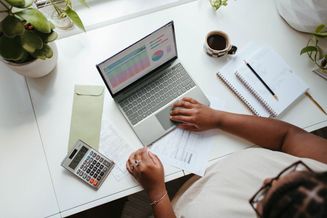How To Register as a Sole Trader
- Modified: 5 September 2023
- 4 min read
- Starting a Company


Melissa Yeo
Author
With eight years of writing experience, Melissa is an expert in telling stories that make a difference for small business owners and entrepreneurs. Her background in content and social media spans a range of industries, including publishing, ecommerce and marketing. Here at Osome, you'll find her making everything running a business less intimidating. From specific accounting and bookkeeping advice to insights for company growth, her articles are about helping you to take the next step on your entrepreneurship journey.
If you are self-employed and run your own business, it’s likely you’ll need to register as a sole trader. This means that you tell HMRC what your business does and file a tax return every year through Self Assessment, allowing the government to collect your income tax.
If you set up as a sole trader in the UK you don’t have to register with Companies House, making it a popular option for businesses that run small operations. The same rules apply if you’re going through an ecommerce company registration.
So, is registering as a sole trader the best option for you? Find out with our guide.
What Is a Sole Trader

When a business has one owner who is self-employed, they are called a sole trader. If you set up as a sole trader it means you’re responsible for the business and have complete control of its operations. The majority of sole traders have a low turnover and no employees. They often provide services such as hairdressing or work in trades like brick laying.
What's the Difference Between a Sole Trader and Being Self-employed?

Being self-employed means that you’re not employed by someone else and you don’t pay tax through PAYE. Sole trader simply refers to what type of business structure you’ve chosen. There are three different types if you’re self-employed — sole trader, a business partnership or a limited company — and sole trader is the most common. However, if you're considering expanding your business and want to register a limited company, our services can assist you through the process.
What Are the Advantages of Registering as a Sole Trader?
Being a Sole trader makes it easy to set up your own business:
- Be your own boss — you have no board or shareholders to answer to.
- Easy self registration set up — you don’t have to register with Companies House, you just need to tell HMRC.
- The profit is yours to keep — it doesn’t have to be paid to shareholders.
- The accounts are straightforward — you don’t have to complete in-depth accounts like limited companies.
What Are the Disadvantages of Registering as a Sole Trader?
There are a few things you need to keep in mind if you’re going to register as a Sole trader:
- You make all the decisions — as the sole owner of the business, there’s no one else to fall back on.
- You take full liability — any business debts are your responsibility and could end up being paid by personal assets, like your home.
- Fewer tax benefits — as a limited company there are often more tax benefits, especially as your turnover increases.
Guide to Registering as a Sole Trader
Choose the Name of Your Business
Many people trade under their own name, but you can choose another name for your business when setting up as a sole trader.
Business names must not include any of the following:
- limited
- Ltd
- limited liability partnership
- LLP
- public limited company
- plc
HMRC also states that names can’t be offensive, contain sensitive words or imply links with the government.
Register with HMRC as a Self Assessment
If you’re self-employed and the income from your business is more than £1,000 a year, you’ll need to register for Self Assessment with HMRC. This is easy to do on the gov.uk website, which guides you through the process step by step.
The rules state that you must register by 5th October in your business’s second year or you could face a fine.
Special Licences and Permissions
For some roles you may need to provide certain qualifications, a licence or permission from your local authority when registering as a sole trader. For example, childminders, taxi drivers and street vendors all require licences to trade. Businesses with premises may be inspected to check they comply with regulations.
Keeping Tax Records
It’s important to keep your financial records in good order throughout the year. Store all your receipts and other records of your transactions in date order to make it easier when it’s time to compile your tax return. It’s worth getting into the habit of checking your records every month to save time and stress at the end of the financial year.
Employees
While many sole traders do not take on employees, this is something you can choose to do if you wish. If you do, you will need to operate a PAYE payroll system. Make sure you have issued contracts of employment and that you collect income tax and NICs from employees, which is paid to HMRC.
National Insurance
As a sole trader, you need to make sure you’re paying the correct level of National insurance contributions. The first step is to register to pay Class 2 National Insurance — you can do this through the Government Gateway at the same time as registering for Self Assessment.
Tax Matters and VAT
Sole traders pay income tax on any profit their business makes. This is calculated on an annual basis when your Self Assessment tax return, which outlines your income and expenses, is submitted to HMRC. Businesses with an annual turnover of more than £90,000 also need to register to pay VAT with HMRC, charge customers VAT and complete VAT returns.
FAQ
How much does it cost to register as a sole trader UK?
It’s free to register as a sole trader in the UK with HMRC – you simply register your details online through the Government Gateway. Many sole traders take care of their own accounts and file their own tax returns, while others pay for specialist help.
How much can a sole trader earn before paying tax UK?
Sole traders get the same tax free amount as people who are employed on PAYE. This is known as your Income Tax Personal Allowance and the current rate for 2021-22 means that sole traders can earn up to £12,570 without paying income tax.
What is required to form a sole trader business?
HMRC expects all sole traders to:
- Keep business records and records of expenses
- Complete and file a Self Assessment tax return each year
- Pay Income Tax on your profits
- Pay Class 2 and Class 4 National Insurance
- Register for VAT if your turnover is over £85,000
Do I need an accountant as a sole trader?
There’s no legal requirement to use an account as a sole trader, and many people manage without one. However, it can save you time and money to enlist a professional to make sure your accounts are in order and you’re making full use of any tax reliefs and allowances.
Do sole traders pay VAT?
If your total taxable turnover exceeds £85,000 for the last 12 months, you must register to pay VAT. VAT registration in the UK applies if you exceed the threshold at the end of any month in the year, so pay attention to your accounts as your business grows.
What's the difference between sole trader and self-employed?
In a nutshell, sole trader refers to your business structure and the meaning of self employed is that you don’t work for an employer or pay tax through PAYE. The majority of self employed people who are solely responsible for their businesses are sole traders.
Do sole traders have to register with Companies House?
No, it’s not necessary for sole traders to register with Companies House. If you set up a limited company or LLP, you need to register your business with Companies House, but as a sole trader you only need to register with HMRC for Self Assessment.
How do I tell HMRC that I am self-employed?
You need to register for Self Assessment and Class 2 National Insurance through the gov.uk portal. If you have not filed a tax return before, you can do this through your business tax account. If you’ve filed a tax return online before, you can re-register online (form CWF1).
Does HMRC check sole traders?
HMRC does check sole traders. However, the tax body only investigates a small number of sole traders every year. Whether or not you think HMRC is going to check your accounts, it’s important to file tax returns accurately and on time.
Can I use my personal bank account as a sole trader?
Yes, you can use your personal bank account as a sole trader. However, it’s strongly recommended that you create a separate account, so it’s easier to keep track of transactions that relate to your business.
More like this
Get expert tips and business insights
By clicking, you agree to our Terms & Conditions,Privacy and Data Protection Policy
We’re using cookies! What does it mean?






